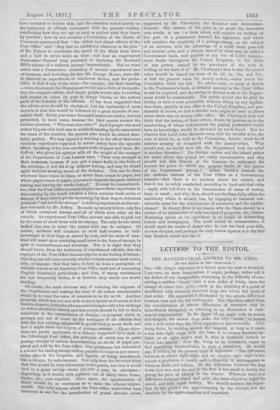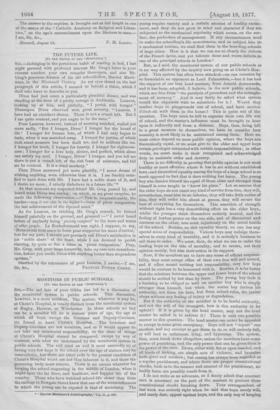LETTERS TO THE EDITOR.
THE MATHEMATICAL ANSWER TO MR. GREG.
[TO THO EDITOR OF MR SPEOTATOR.1 Sin,—Mr. Greg's objection to a future state for man is founded, I am sure, on mere imagination, I might, perhaps, rather call it the defect of our imagination, consisting in the difficulty of con- ceiving a sudden " burst" into a new order of being, upon the change of almost into quite,—suchas the attaining of a point of excellence only minutely removed from one which fell short of that order. His argument is illustrated by the minute difference between man and the last anthropoid. The objection raised from the consideration of minute differences of structure may be immediately dissipated, on referring to an illustration in rudi- mental trigonometry. In the figure of an angle with its secant and tangent, the secant does make the very " burst," or bound into a new order that Mr. Greg supposes so inconceivable. After being finite, by striking against the tangent, as long as it made a less than right angle with the base, it no sooner becomes up- right, or at right angles with it, than it forthwith bounds or bursts into infinite, Now Mr. Greg, to be consistent, ought to find something inconceivable in such a transition, He would say, if holding by his present form of argument, " The difference between an almost right angle and an absqlute right angle is too minute a gradation to justify such a disparity in prolongation as between finite and infinite. So the difference between the first horse in a race and the next to the first is too small to justify the giving the prize of victory to the winner. Wherever there is a difference between almost and quite, the same objection might be raised, and with equal futility. We should measure the imper- fect by the perfect, the approximating by the absolute, not the absolute by the approximating and imperfect. The answer to the sophism is brought out at full length in one of the essays of the " Catholic Academy on Religion and Litera- ture," on the ape's encroachment upon the likeness to man.— I am, Sir, Sm.,



































 Previous page
Previous page